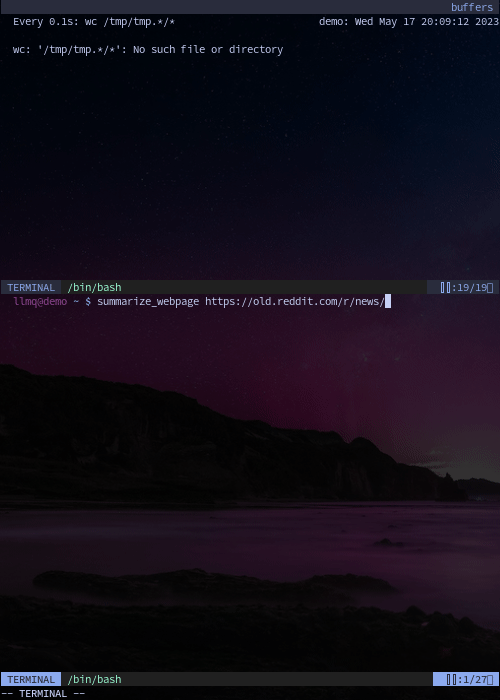|
|
||
|---|---|---|
| .assets | ||
| 3rdparty | ||
| examples | ||
| plugins | ||
| .gitignore | ||
| AUTHORS.md | ||
| CHANGELOG.md | ||
| CONTRIBUTING.md | ||
| LICENSE | ||
| Makefile | ||
| README.md | ||
| llmq.1 | ||
| llmq.cc | ||
| llmq.h | ||
README.md
oooo oooo
`888 `888
888 888 ooo. .oo. .oo. .ooooo oo
888 888 `888P"Y88bP"Y88b d88' `888
888 888 888 888 888 888 888
o888o o888o o888o o888o o888o `V8bod888
┌─────────────────────────────────┐ 888
│ a query CLI and context manager │ 888.
│ for LLM-powered shell pipelines │ 8P'
└─────────────────────────────────┘ "
Contents
SYNOPSIS
Usage
llmq [-hqiv] [ACTION] [PLUGIN][://[~]CONTEXT] [OPTIONS]... [--] [MSGS]...
Description
The llmq executable is a terminal-friendly wrapper for large language models that:
- Reads command-line arguments and/or input from stdin
- Handles file I/O efficiently by writing deltas
- Performs HTTPS GET or POST requests using cURL
- Stores credentials in restrictive files
- Parses YAML quickly using rapidyaml
llmq is built around plugins, which are designed to be easy to create.
See the plugins section for guidelines.
Plugin Directories
$XDG_CONFIG_HOME/llmq/PLUGIN(or~/.config/llmq/PLUGIN)- stores authfile and any other plugin-specific configuration files
$XDG_DATA_HOME/llmq/PLUGIN(or~/.local/share/llmq/PLUGIN)- stores conversation context as
*.ymlfiles
- stores conversation context as
/tmp/llmq/PLUGIN- stores temporary context files (specified by a ~ prefix; see CONTEXT)
Files and directories are automatically created/populated if they do not exist.
llmq Flags
-h, --help
print a help message and exit.
-q, --quiet
do not print reply to stdout (chat mode only).
-i, --no-stdin
does not read from stdin, even if MSGS is missing (query/chat).
-v, --verbose
print cURL and other llmq diagnostics to stderr.
note: any flags after PLUGIN are considered plugin OPTIONS
ACTION
q | query
# makes a request and streams reply to stdout
llmq query plug://ctx "hello"
# listens for stdin if no MSGS supplied
echo "hey!" | llmq q plug://ctx
# a query may omit context if the plugin supports it
echo "listen!" | llmq q plug
c | chat
# makes a request, streams reply to stdout, and updates context
llmq chat plug://ctx "hello"
# listens for stdin if no MSGS supplied
echo "hi!" | llmq c plug://ctx
# ignores stdin; assumes context was edited externally
# note: see the demonstration section for an example
llmq -i c plug://ctx
i | init
# initialize a context file in the data dir
llmq init plug://ctx -m modelname
# creates a named temporary context file in the temp dir
llmq init plug://~foo -m modelname
# creates a temporary, unique context file in the temp dir
tmpctx=`llmq init plug -m modelname`
# references the temporary context
# note: tmpctx begins with "plug://~"
llmq q $tmpctx "hello"
e | edit
# opens a context file for editing
llmq edit plug://ctx
a | auth
# opens the authfile for editing (600 perms by default, warns otherwise)
llmq auth plug
p | path
# /home/user/.local/share/llmq/plug/ctx.yml
llmq path plug://ctx
# /tmp/llmq/plug/~ctx.yml
llmq path plug://~ctx
# /home/user/.local/share/llmq/plug
llmq path plug
d | del
# deletes a context file
llmq del plug://ctx
# deletes a temporary context file
llmq del plug://~ctx
k | kill
# spawns a background llmq process
llmq -iq c plug://ctx "please list 10 random things" &
# kills the process
llmq kill plug://ctx
l | list
# prints a table of registered plugins and descriptions
llmq list
h | help
# prints the main help message (same as llmq -h)
llmq help
# prints the help message for plugin `plug`
llmq help plug
notes:
- ACTION always required, except when using
-h - CONTEXT required for
c|e|d|k - OPTIONS/MSGS/stdin ignored for
e|a|p|d|k|l|h - stdin ignored for
i
PLUGIN
The name of the target plugin.
CONTEXT
A YAML-encoded query/chat context file (e.g. model parameters, messages). CONTEXT omits the ".yml" suffix present on all context files. If CONTEXT begins with '~', it is stored in the temp directory.
OPTIONS
Named arguments or flags to pass to the plugin.
"--" may be used to indicate the end of OPTIONS and the start of MSGS.
MSGS
Positional plugin arguments. These are typically messages, but can be any positional argument supported by the plugin. If ACTION is query or chat (and -i is not used), llmq reads stdin into one MSG.
Plugins
llmq is built around plugins, which are compiled into the executable.
To register a plugin, derive llmq::plugin in plugins/*.cc an create a static/inline instance.
// base class for plugins. create a static instance to register it with the executable.
struct plugin {
struct arg {
int name; // shortopt char or longopt val, 0 if unnamed
std::string value; // empty if no value (flag)
};
// name of the plugin. called before init.
[[nodiscard]] virtual std::string_view name() const noexcept = 0;
// path to the plugin configuration directory. called before init.
// if not overridden (or empty), uses $XDG_CONFIG_HOME/llmq/PLUGIN
// (or ~/.config/llmq/PLUGIN if XDG_CONFIG_HOME is not found).
// the confdir will be created if not found.
[[nodiscard]] virtual std::filesystem::path confdir() const noexcept;
// path to the plugin context storage. called before init.
// if not overridden (or empty), uses $XDG_DATA_HOME/llmq/PLUGIN
// (or ~/.local/share/llmq/PLUGIN if XDG_DATA_HOME is not found).
// the datadir will be created if not found.
[[nodiscard]] virtual std::filesystem::path datadir() const noexcept;
// path to the temporary plugin context storage. called before init.
// if not overridden (or empty), uses /tmp/llmq/PLUGIN.
// the tmpdir will be created if not found.
[[nodiscard]] virtual std::filesystem::path tmpdir() const noexcept;
// getopt shortopts. empty string_view disables shortopts. called before init.
[[nodiscard]] virtual std::string_view shortopts() const noexcept;
// getopt longopts. nullptr disables longopts. called before init.
[[nodiscard]] virtual option const* longopts() const noexcept;
// provides the help string. called before init.
[[nodiscard]] virtual std::string_view help() const noexcept = 0;
// the plugin usage statement. called before init.
[[nodiscard]] virtual std::string_view usage() const noexcept = 0;
// a short one-line description of the plugin. called before init.
[[nodiscard]] virtual std::string_view descr() const noexcept = 0;
// registers the plugin. instances must be static.
plugin(std::source_location loc = std::source_location::current()) noexcept;
plugin(plugin const&) = delete;
plugin(plugin&&) = delete;
plugin& operator=(plugin const&) = delete;
plugin& operator=(plugin&&) = delete;
virtual ~plugin() = default;
// initialize the plugin with the context tree, plugin args, and authfile data.
// guaranteed to be called before context, url, headers, post, and onreply.
virtual void init(ryml::Tree context, std::span<arg const> args, std::string auth) = 0;
// provides the current, updated context.
[[nodiscard]] virtual ryml::Tree const& context() const = 0;
// provides the endpoint URL.
[[nodiscard]] virtual std::string_view url() const = 0;
// appends the request headers.
virtual void append_headers(std::function<void(std::string_view)> append) const = 0;
// computes the postdata. if not overridden (or nullopt), llmq uses GET instead.
[[nodiscard]] virtual std::optional<std::string_view> post() const;
// integrate a reply into the context.
// onreply should print content if print is true (if applicable).
virtual void onreply(std::string_view reply, bool print) = 0;
// called when the response has completed. prints a newline by default (if print).
virtual void onfinish(bool print);
};
See plugins/gpt.{h,cc} for an example.
makecompiles all plugins into an executable.*.mkfiles in theplugins/directory may add targets and modify variables, e.g.:
.o/plugins/myplug.o: CXXFLAGS += $(shell pkg-config --cflags somepkg)
LDFLAGS += $(shell pkg-config --libs somepkg)
See contributing if you want to add a plugin to the library.
Installation
Dependencies
- GNU/Linux
- pkg-config
- C++20
- libcurl
- rapidyaml 0.5.0 is embedded with exceptions enabled
Setup
git clone https://github.com/jpcx/llmq.git
cd llmq
make
make install # sudo or root
Examples
In the examples/ folder, you will find several examples of bash scripts that
use llmq within bash pipelines.
cmd: generates and executes a bash command on the system based on user input. uses GPT-3.5 for interpreting and GPT-4 for generating.codegen: generates a single function in a programming language. uses GPT-3.5 to produce 3 alternatives and GPT-4 to review the proposed solutions and produce the actual result.introspection: allows GPT-3.5 to have a conversation with itself about anything.scmd: same as cmd, but uses an additional GPT-3.5 layer and modified prompts to prevent the script from executing anything that would modify the system in any way.selftest: given a lesson plan, GPT-4 acts as a professor and quizzes GPT-3.5 about the topic.summarize: iteratively splits the input into chunks, summarizes each with GPT-3.5, combines their summaries, and repeats until the output is enough for a final GPT-3.5 summary.summarize_webpage: calls summarize with the result of curl and html2text.
Demonstration
A demonstration of the original motivation behind this tool (generic editor integration).
llmq e gpt://demoopens a new context in NeoVim for editing.:call timer_start(300, {-> nvim_command('sil! checktime')}, {'repeat': -1})enables autorefresh.- Live edits provide parameters and user messages.
:sil! !llmq -iq c gpt://demo &starts the request and (quietly) updates the context.:sil! !llmq k gpt://demokills the process.
An illustration of the potential for complex interactions between LLMs and the system.
- See
examples/cmd
An interesting dialogue between two LLMs.
- See
examples/selftest
A simple implementation of web summaries using GPT-3.5.
- See
examples/summarize_webpage
Contributing
If you have implemented a plugin for another language model, please make a pull request!
I want to avoid including plugins that can be replicated using prompts and piping alone,
but core language model API clients are more than welcome. Please use the provided
.clang-format for formatting, and embed any dependencies in the 3rdparty/ folder.
AGPL Notice
Copyright (C) 2023 Justin Collier <m@jpcx.dev>
This program is free software: you can redistribute it and/or modify
it under the terms of the GNU Affero General Public License as
published by the Free Software Foundation, either version 3 of the
License, or (at your option) any later version.
This program is distributed in the hope that it will be useful,
but WITHOUT ANY WARRANTY; without even the implied warranty of
MERCHANTABILITY or FITNESS FOR A PARTICULAR PURPOSE. See the
GNU Affero General Public License for more details.
You should have received a copy of the GNU Affero General Public License
along with this program. If not, see <https://www.gnu.org/licenses/>.



